Transit Connect Wagon
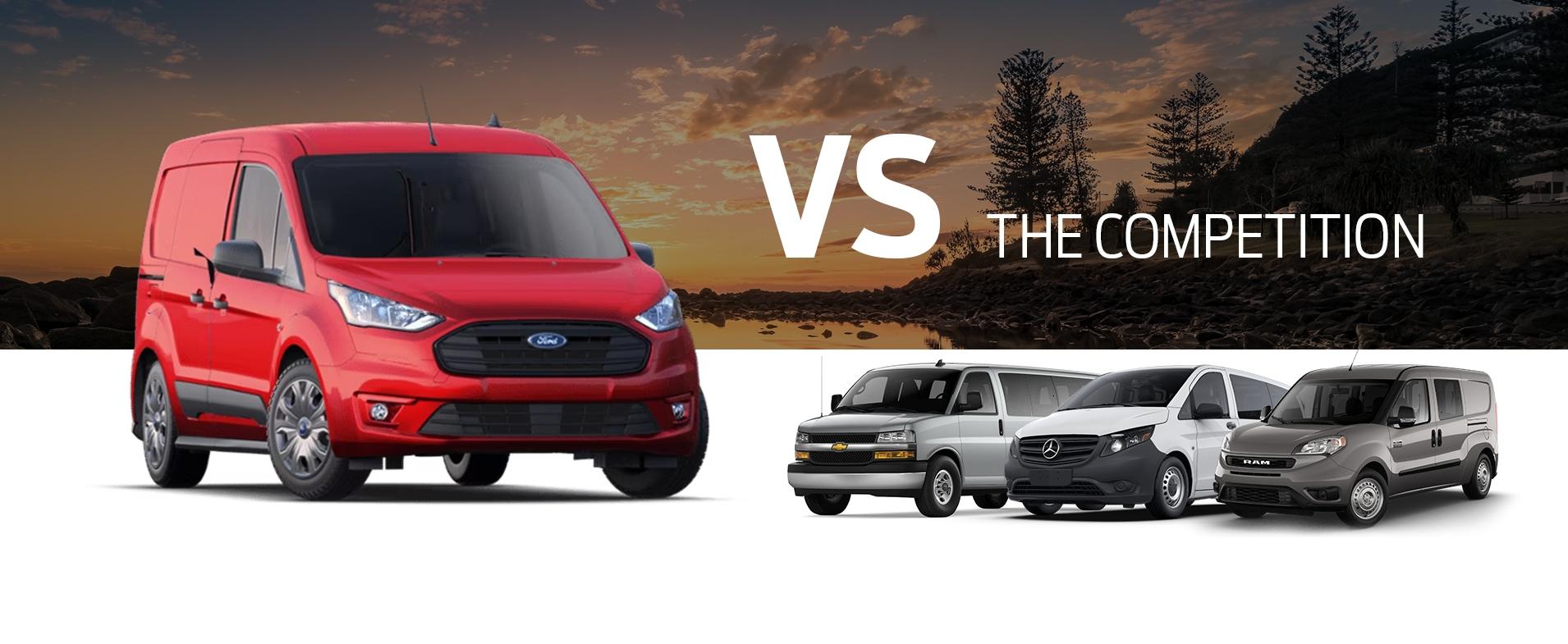
Transit Connect Wagon VS Chevrolet Express Passenger
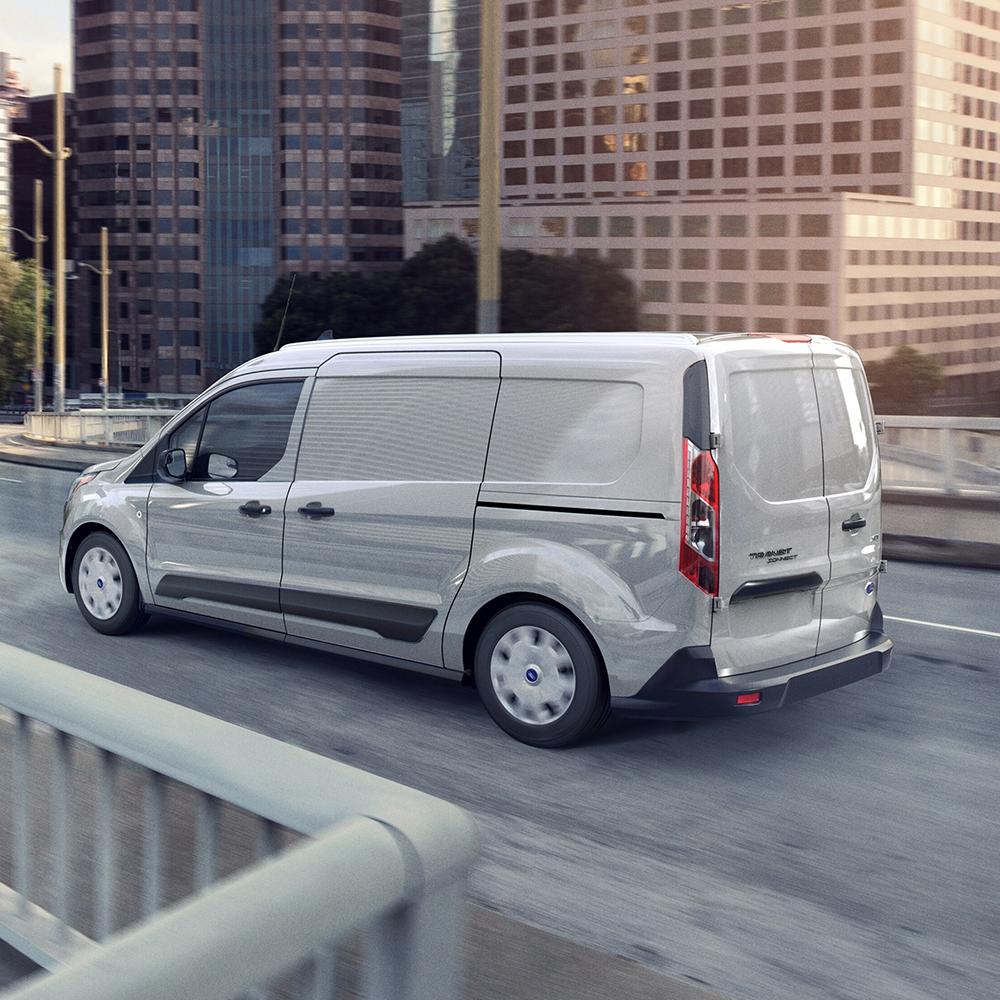
AWARDS & SAFETY
The 2023 Ford Transit Connect Wagon's3 active Blind Spot Monitoring System warns you when a vehicle enters your blind spot, a little more peace of mind as a standard feature. Want that extra security on the Express Passenger? Blind Spot Monitoring isn't standard on the 2023 Chevrolet Express Passenger2, so it will cost you.
| 2023 Ford Transit Connect Wagon | 2023 Chevrolet Express Passenger |
|---|---|
| Blind Spot Monitoring System | |
| standard3 | optional2 |
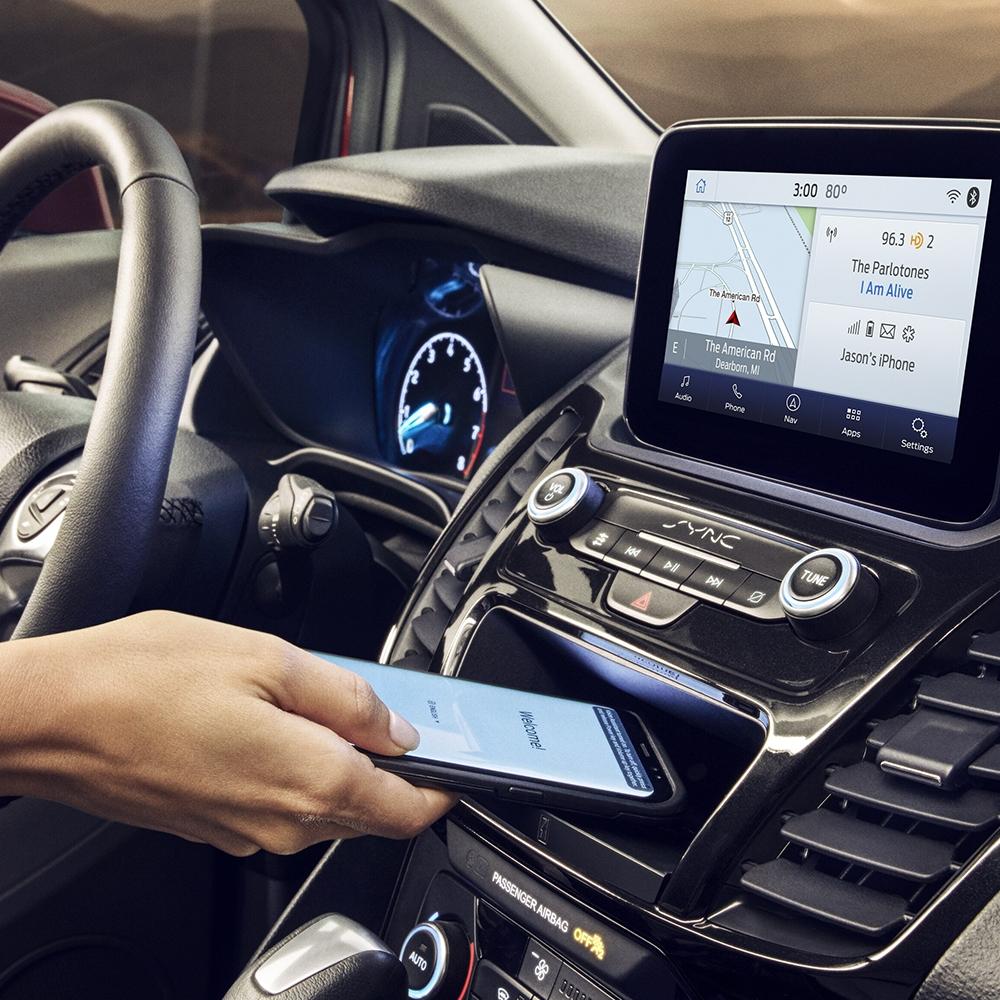
FEATURES
Strong, lightweight, and aesthetically pleasing, alloy wheels come standard on the 2023 Ford Transit Connect Wagon1. They're also available as an option on the 2023 Chevrolet Express Passenger, but they'll cost extra.
Enjoy the hands-free convenience and safety of Bluetooth, standard on the 2023 Ford Transit Connect Wagon1, but an upcharge option only on the 2023 Chevrolet Express Passenger2.
Heat or cool the interior of the 2023 Ford Transit Connect Wagon3 comfortably, using its convenient standard climate control features.
| 2023 Ford Transit Connect Wagon | 2023 Chevrolet Express Passenger |
|---|---|
| Alloy Wheels | |
| standard1 | - |
| Bluetooth Connectivity | |
| standard1 | optional2 |
| Climate Control | |
| standard3 | - |
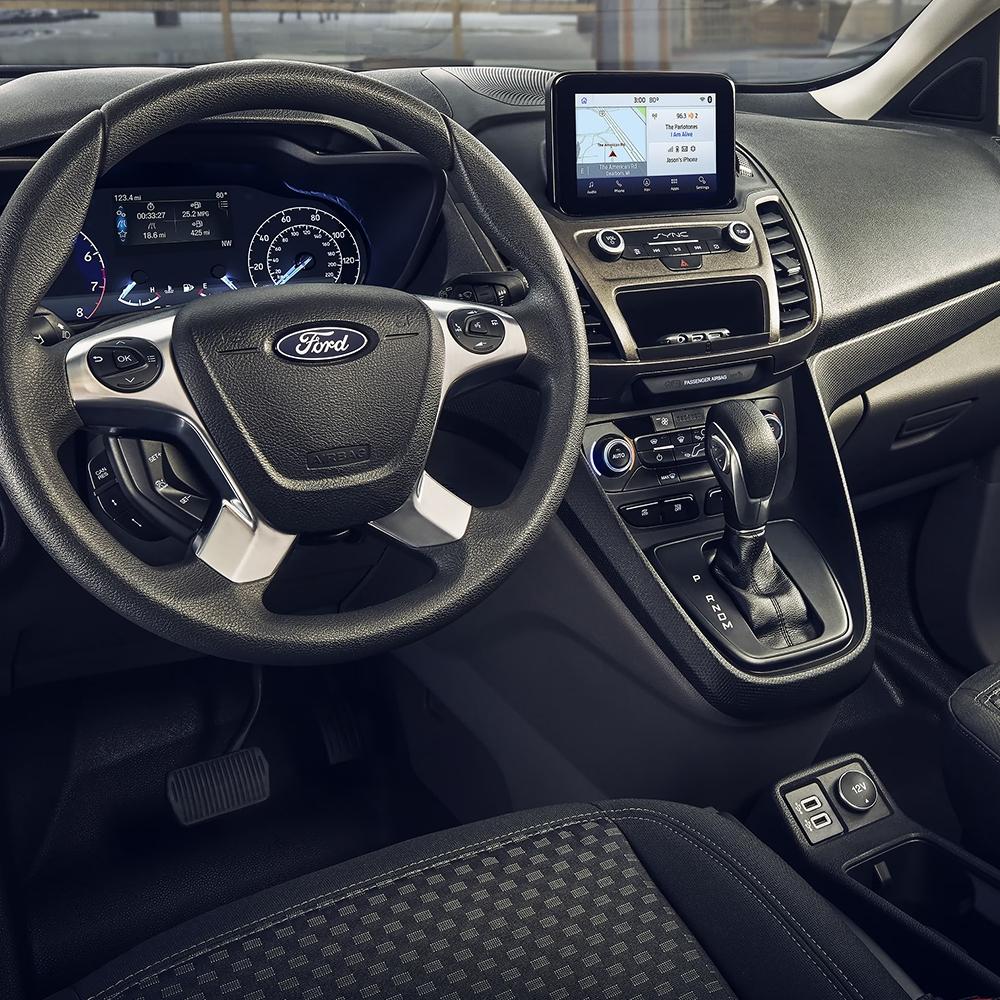
FEATURES
While they're not as popular in more mild areas, in frigid climates many drivers find heated seats, a standard feature on the 2023 Ford Transit Connect Wagon4, quite necessary. If you want heated seats on the 2023 Chevrolet Express Passenger, though, you'll have to pay extra for them.
Is it possible to get increased visibility while using less energy? With the HID Headlights that come standard on the 2023 Ford Transit Connect Wagon4, the answer is yes. On the 2023 Chevrolet Express Passenger, those brilliant, energy-efficient HID headlights are a pricey add-on.
A match made in heaven: warm in one zone, cool in another, giving each occupant control over their own climatic comfort. On the 2023 Ford Transit Connect Wagon3, multi-zone climate control comes standard... but not on the 2023 Chevrolet Express Passenger.
| 2023 Ford Transit Connect Wagon | 2023 Chevrolet Express Passenger |
|---|---|
| Heated Front Seats | |
| standard4 | - |
| HID Headlights | |
| standard4 | - |
| Multi-Zone Climate Control | |
| standard3 | - |
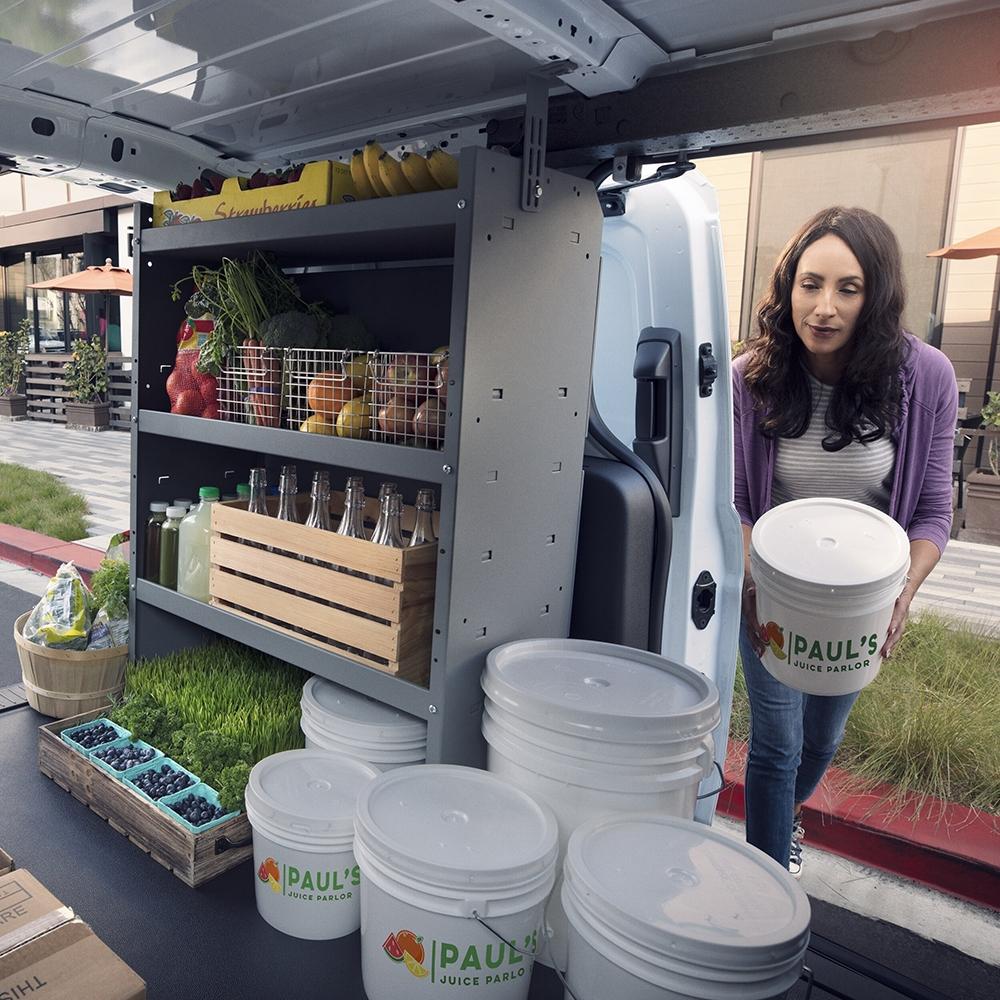
FEATURES
Getting where you're going has never been easier, with turn-by-turn directions and other features of the 2023 Ford Transit Connect Wagon's4 standard on-board navigation system. If you want the convenience and peace of mind of an on-board nav system in the 2023 Chevrolet Express Passenger, you'll have to pay extra for it.
Move forward, back, up, or down with the touch of a button, using the Power Adjustable Seats that come standard on the 2023 Ford Transit Connect Wagon3. Power Adjustable Seats aren't standard on the 2023 Chevrolet Express Passenger2, so be prepared to either pay more, or use that awkward bar under the seat.
No more parallel parking jitters - the Rear Parking Aid, standard on the 2023 Ford Transit Connect Wagon1, can help guide you into the perfect parking spot, signaling when you're getting too close to the curb, or other cars. Unless you enjoy the parallel parking jitters, in which case, choose the 2023 Chevrolet Express Passenger2, and don't pay extra for the rear parking aid option.
| 2023 Ford Transit Connect Wagon | 2023 Chevrolet Express Passenger |
|---|---|
| Navigation System | |
| standard4 | - |
| Power Adjustable Seats | |
| standard3 | optional2 |
| Rear Parking Aid | |
| standard1 | optional2 |
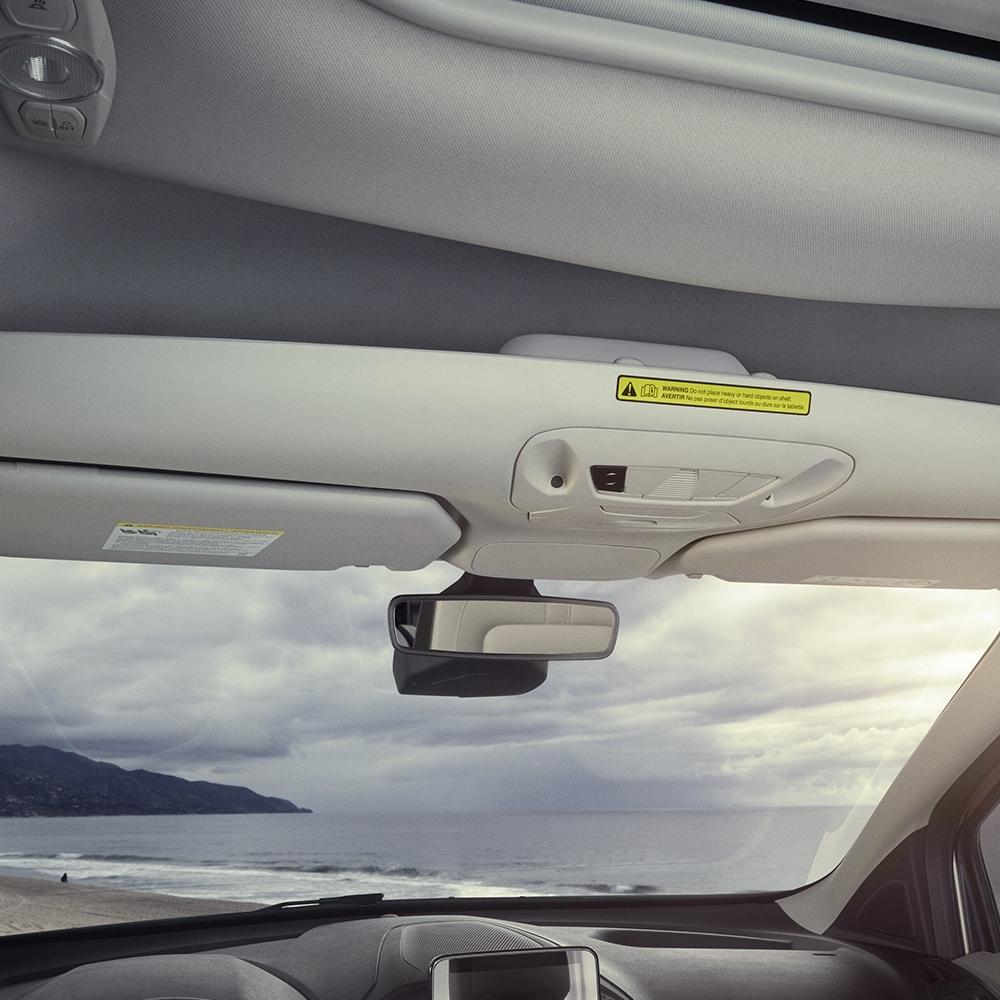
FEATURES
Even the most discerning music aficionado is sure to find a channel to enjoy on satellite radio, a standard feature on the 2023 Ford Transit Connect Wagon3... but not on the 2023 Chevrolet Express Passenger2.
The 2023 Ford Transit Connect Wagon's5 optional sunroof lets the light in on even the gloomiest day. Sadly, the 2023 Chevrolet Express Passenger doesn't come with a sunroof, no matter how nicely you ask for one.
| 2023 Ford Transit Connect Wagon | 2023 Chevrolet Express Passenger |
|---|---|
| Satellite Radio | |
| standard3 | optional2 |
| Sunroof | |
| optional5 | - |
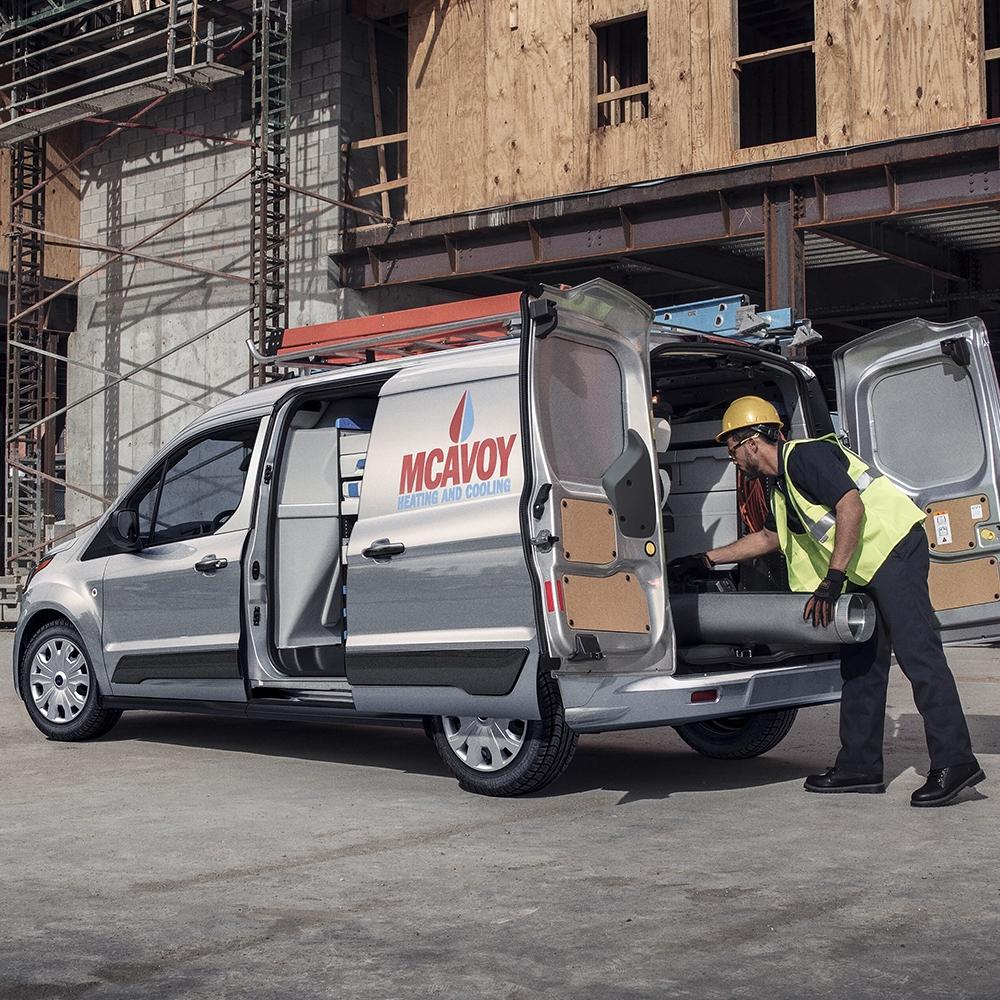
PERFORMANCE
More transmission speeds means a better overall ratio spread - in other words, smoother acceleration - and the 2023 Ford Transit Connect Wagon1 has 81 speeds, 2 more than the 2023 Chevrolet Express Passenger2.
If you live in a climate with snow and ice, or if you're interested in increased fuel economy, the 2023 Ford Transit Connect Wagon's1 front-wheel drive offers a distinct advantage over the 2023 Chevrolet Express Passenger.
| 2023 Ford Transit Connect Wagon | 2023 Chevrolet Express Passenger |
|---|---|
| Transmission Speeds | |
| 81 | 62 |
| Front Driven Wheels | |
| has1 | - |
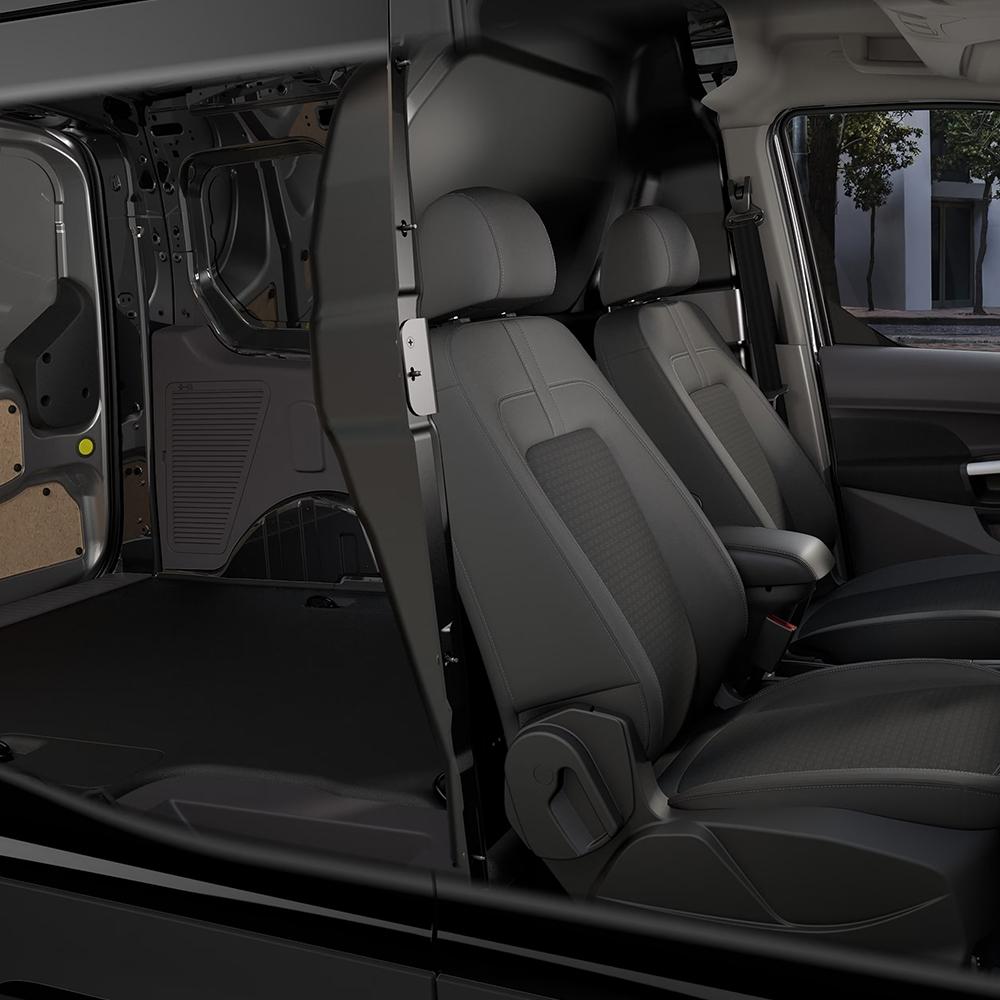
USABILITY
Whether you're chauffeuring your kids to ballet, or the Harlem Globetrotters to a game (it could happen), all of your passengers will be more comfortable with the 2023 Ford Transit Connect Wagon's6 combined total of more inches of head and leg room in the front and rear seats.
The 2023 Ford Transit Connect Wagon's6 tighter turn radius means more agile maneuvering and easier parking.
| 2023 Ford Transit Connect Wagon | 2023 Chevrolet Express Passenger |
|---|---|
| Front Head Room | |
| 466 | 402 |
| Front Leg Room | |
| 466 | 402 |
| Rear Head Room | |
| 456 | 382 |
| Rear Leg Room | |
| 456 | 382 |
| Turning Circle | |
| 406 | 492 |
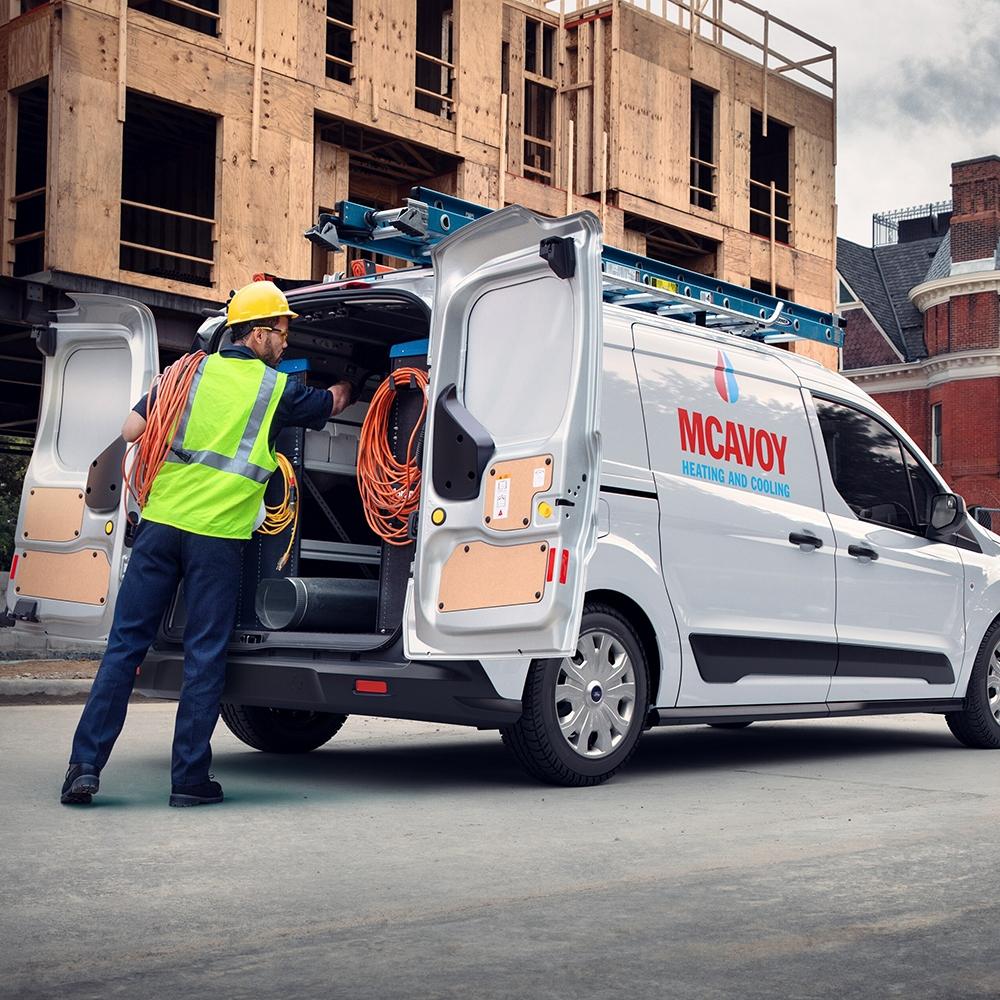
PRICING & WARRANTY
The makers of the 2023 Ford Transit Connect Wagon6 are so confident in their materials and workmanship, they'll pay for the cost of perforation repairs for 2 years longer than the 2023 Chevrolet Express Passenger2 - quite a consideration for drivers who live in climates where corrosion is a risk.
The 2023 Ford Transit Connect Wagon6 is priced at $7,940 less than the 2023 Chevrolet Express Passenger2 - that's some pretty sizable savings.
| 2023 Ford Transit Connect Wagon | 2023 Chevrolet Express Passenger |
|---|---|
| Corrosion Warranty | |
| 56 | 32 |
| MSRP | |
| $34,3606 | $42,3002 |
© AutoWhyBuy, All Rights Reserved
Vehicle comparison data provided by Chrome Data Solutions, LP. Copyright © 1998-2024 2024 Chrome Data Solutions, LP. All rights reserved.
Chrome DataTM is the property of Chrome Data Solutions, LP, and may not be reproduced or distributed without their consent.
1 - 2023 Ford Transit Connect Wagon XL LWB w/Rear Liftgate
2 - 2023 Chevrolet Express Passenger RWD 2500 135
3 - 2023 Ford Transit Connect Wagon XLT LWB w/Rear Symmetrical Doors
4 - 2023 Ford Transit Connect Wagon Titanium LWB w/Rear Liftgate
5 - 2023 Ford Transit Connect Wagon XLT LWB w/Rear Liftgate
6 - 2023 Ford Transit Connect Wagon XL LWB w/Rear Symmetrical Doors
Transit Connect Wagon VS RAM ProMaster City Wagon

AWARDS & SAFETY
The 2023 Ford Transit Connect Wagon's7 active Blind Spot Monitoring System warns you when a vehicle enters your blind spot, a little more peace of mind as a standard feature. Want that extra security on the ProMaster City Wagon? Blind Spot Monitoring isn't standard on the 2022 Ram ProMaster City Wagon, so it will cost you.
The safety and durability of front and rear disc brakes come standard on the 2023 Ford Transit Connect Wagon, but not on the 2022 Ram ProMaster City Wagon.
If your vehicle begins to drift out of its lane, the Lane Departure Warning System, standard on the 2023 Ford Transit Connect Wagon7, will sound an alarm. This extra layer of safety isn't standard on the 2022 Ram ProMaster City Wagon, so if you want it, you'll have to pay extra.
| 2023 Ford Transit Connect Wagon | 2022 RAM ProMaster City Wagon |
|---|---|
| Blind Spot Monitoring System | |
| standard7 | - |
| Front and Rear Disc Brakes | |
| has2 | - |
| Lane Departure Warning System | |
| standard7 | - |
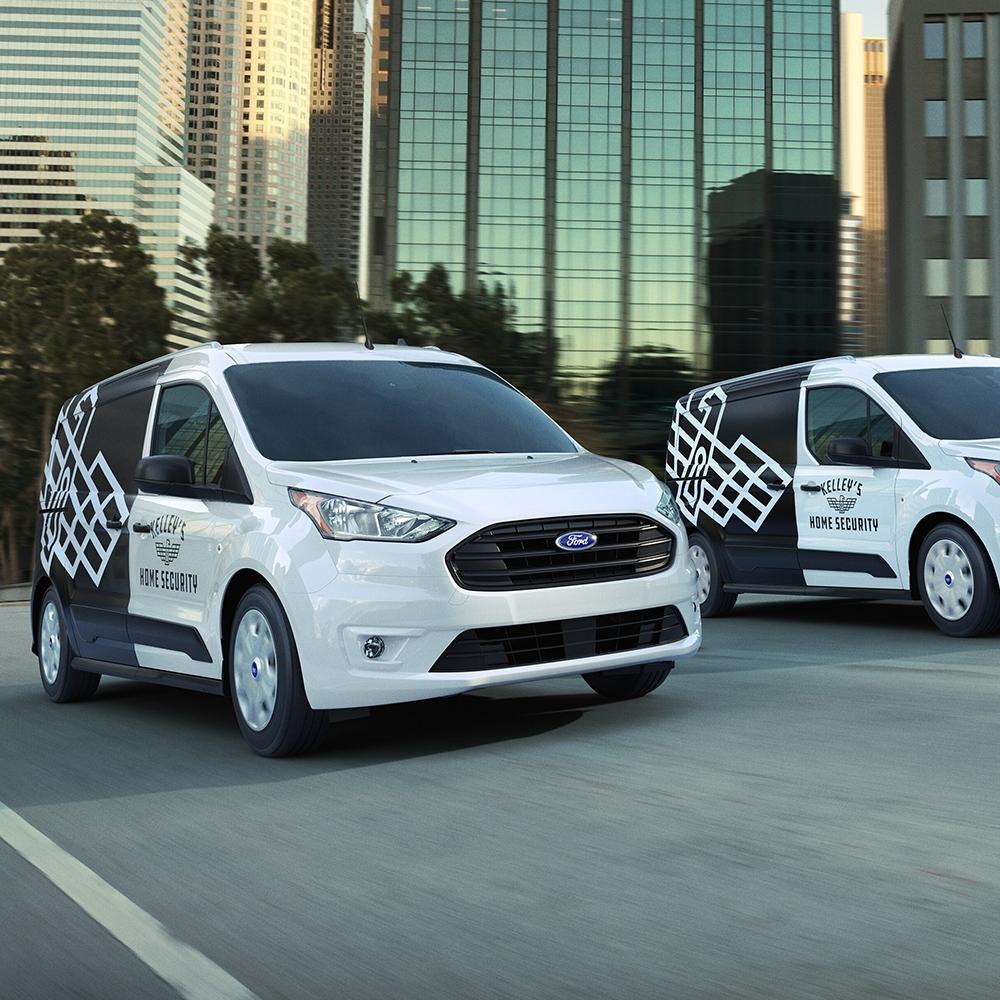
EFFICIENCY
If you're trying to pinch pennies, every mile per gallon toward better fuel economy counts, including the 3 between the 2023 Ford Transit Connect Wagon2 and the 2022 Ram ProMaster City Wagon3 in the city. After all, the average American drives more than 13,000 miles a year - here's to more driving, and less stopping for gas1.
| 2023 Ford Transit Connect Wagon | 2022 RAM ProMaster City Wagon |
|---|---|
| EPA Estimated City MPG | |
| 242 | 213 |

FEATURES
While they're not as popular in more mild areas, in frigid climates many drivers find heated seats, a standard feature on the 2023 Ford Transit Connect Wagon4, quite necessary. If you want heated seats on the 2022 Ram ProMaster City Wagon3, though, you'll have to pay extra for them.
Is it possible to get increased visibility while using less energy? With the HID Headlights that come standard on the 2023 Ford Transit Connect Wagon4, the answer is yes. On the 2022 Ram ProMaster City Wagon, those brilliant, energy-efficient HID headlights are a pricey add-on.
The refinement and luxury of leather seating is a standard feature in the 2023 Ford Transit Connect Wagon5, but it's only available as an add-on option in the 2022 Ram ProMaster City Wagon.
| 2023 Ford Transit Connect Wagon | 2022 RAM ProMaster City Wagon |
|---|---|
| Heated Front Seats | |
| standard4 | optional3 |
| HID Headlights | |
| standard4 | - |
| Leather Seating | |
| standard5 | - |

FEATURES
A match made in heaven: warm in one zone, cool in another, giving each occupant control over their own climatic comfort. On the 2023 Ford Transit Connect Wagon6, multi-zone climate control comes standard... but not on the 2022 Ram ProMaster City Wagon.
Getting where you're going has never been easier, with turn-by-turn directions and other features of the 2023 Ford Transit Connect Wagon's4 standard on-board navigation system. If you want the convenience and peace of mind of an on-board nav system in the 2022 Ram ProMaster City Wagon3, you'll have to pay extra for it.
Move forward, back, up, or down with the touch of a button, using the Power Adjustable Seats that come standard on the 2023 Ford Transit Connect Wagon6. Power Adjustable Seats aren't standard on the 2022 Ram ProMaster City Wagon, so be prepared to either pay more, or use that awkward bar under the seat.
| 2023 Ford Transit Connect Wagon | 2022 RAM ProMaster City Wagon |
|---|---|
| Multi-Zone Climate Control | |
| standard6 | - |
| Navigation System | |
| standard4 | optional3 |
| Power Adjustable Seats | |
| standard6 | - |

FEATURES
Even the most discerning music aficionado is sure to find a channel to enjoy on satellite radio, a standard feature on the 2023 Ford Transit Connect Wagon6... but not on the 2022 Ram ProMaster City Wagon.
The 2023 Ford Transit Connect Wagon's6 optional sunroof lets the light in on even the gloomiest day. Sadly, the 2022 Ram ProMaster City Wagon doesn't come with a sunroof, no matter how nicely you ask for one.
| 2023 Ford Transit Connect Wagon | 2022 RAM ProMaster City Wagon |
|---|---|
| Satellite Radio | |
| standard6 | - |
| Sunroof | |
| optional6 | - |

USABILITY
Who wouldn't want more miles between fill-ups? With a 6 miles higher estimated combined tank range, the 2023 Ford Transit Connect Wagon5 will keep you on the road longer than the 2022 Ram ProMaster City Wagon3.
Offering more inches in combined rear head and rear leg room than the 2022 Ram ProMaster City Wagon3, the 2023 Ford Transit Connect Wagon5 is roomy enough for even the tallest of your passengers to travel in comfort. Bye-bye cramped "airplane-legs," hello rear passenger comfort.
| 2023 Ford Transit Connect Wagon | 2022 RAM ProMaster City Wagon |
|---|---|
| Estimated Combined Tank Range | |
| 3905 | 3843 |
| Rear Head Room | |
| 455 | 443 |
| Rear Leg Room | |
| 455 | 443 |

USABILITY
The 2023 Ford Transit Connect Wagon7 offers seating for 67 of your friends and family - in the 2022 Ram ProMaster City Wagon3, 1 of them would have to stay behind.
The 2023 Ford Transit Connect Wagon's5 slightly smaller turn radius means more agile maneuvering and easier parking.
| 2023 Ford Transit Connect Wagon | 2022 RAM ProMaster City Wagon |
|---|---|
| Seating Capacity | |
| 67 | 53 |
| Turning Circle | |
| 405 | 423 |
© AutoWhyBuy, All Rights Reserved
Vehicle comparison data provided by Chrome Data Solutions, LP. Copyright © 1998-2024 2024 Chrome Data Solutions, LP. All rights reserved.
Chrome DataTM is the property of Chrome Data Solutions, LP, and may not be reproduced or distributed without their consent.
1 - Average American drives 13,476 miles per year (source: http://www.fhwa.dot.gov/ohim/onh00/bar8.htm)
2 - 2023 Ford Transit Connect Wagon XL LWB w/Rear Symmetrical Doors
3 - 2022 Ram ProMaster City Wagon Wagon
4 - 2023 Ford Transit Connect Wagon Titanium LWB w/Rear Liftgate
5 - 2023 Ford Transit Connect Wagon XL LWB w/Rear Liftgate
6 - 2023 Ford Transit Connect Wagon XLT LWB w/Rear Liftgate
7 - 2023 Ford Transit Connect Wagon XLT LWB w/Rear Symmetrical Doors
Transit Connect Wagon VS Mercedes-Benz Metris Cargo Van

AWARDS & SAFETY
The 2023 Ford Transit Connect Wagon's5 active Blind Spot Monitoring System warns you when a vehicle enters your blind spot, a little more peace of mind as a standard feature. Want that extra security on the Metris Passenger Van? Blind Spot Monitoring isn't standard on the 2023 Mercedes-Benz Metris Passenger Van2, so it will cost you.
If your vehicle begins to drift out of its lane, the Lane Departure Warning System, standard on the 2023 Ford Transit Connect Wagon5, will sound an alarm. This extra layer of safety isn't standard on the 2023 Mercedes-Benz Metris Passenger Van2, so if you want it, you'll have to pay extra.
| 2023 Ford Transit Connect Wagon | 2023 Mercedes-Benz Metris Cargo Van |
|---|---|
| Blind Spot Monitoring System | |
| standard5 | optional2 |
| Lane Departure Warning System | |
| standard5 | optional2 |

EFFICIENCY
Who says you can't have both luxury and eco-friendly fuel efficiency? The 2023 Ford Transit Connect Wagon1 offers more miles per gallon both in the city and on the highway than the 2023 Mercedes-Benz Metris Passenger Van2 - 6 more and 6 more MPGs, respectively - meaning you'll use less fuel and emit fewer greenhouse gases, while still enjoying the luxury and performance you've come to expect from Ford. Bravo!
| 2023 Ford Transit Connect Wagon | 2023 Mercedes-Benz Metris Cargon Van |
|---|---|
| EPA Estimated City MPG | |
| 241 | 182 |
| EPA Estimated Highway MPG | |
| 281 | 222 |

FEATURES
While they're not as popular in more mild areas, in frigid climates many drivers find heated seats, a standard feature on the 2023 Ford Transit Connect Wagon3, quite necessary. If you want heated seats on the 2023 Mercedes-Benz Metris Passenger Van2, though, you'll have to pay extra for them.
Is it possible to get increased visibility while using less energy? With the HID Headlights that come standard on the 2023 Ford Transit Connect Wagon3, the answer is yes. On the 2023 Mercedes-Benz Metris Passenger Van, those brilliant, energy-efficient HID headlights are a pricey add-on.
The refinement and luxury of leather seating is a standard feature in the 2023 Ford Transit Connect Wagon1, but it's only available as an add-on option in the 2023 Mercedes-Benz Metris Passenger Van.
| 2023 Ford Transit Connect Wagon | 2023 Mercedes-Benz Metris Cargo Van |
|---|---|
| Heated Front Seats | |
| standard3 | optional2 |
| HID Headlights | |
| standard3 | - |
| Leather Seating | |
| standard1 | - |

FEATURES
A match made in heaven: warm in one zone, cool in another, giving each occupant control over their own climatic comfort. On the 2023 Ford Transit Connect Wagon4, multi-zone climate control comes standard... but not on the 2023 Mercedes-Benz Metris Passenger Van.
Move forward, back, up, or down with the touch of a button, using the Power Adjustable Seats that come standard on the 2023 Ford Transit Connect Wagon4. Power Adjustable Seats aren't standard on the 2023 Mercedes-Benz Metris Passenger Van, so be prepared to either pay more, or use that awkward bar under the seat.
| 2023 Ford Transit Connect Wagon | 2023 Mercedes-Benz Metris Cargon Van |
|---|---|
| Mutli-Zone Climate Control | |
| standard4 | - |
| Power Adjustable | |
| standard4 | - |

FEATURES
No more parallel parking jitters - the Rear Parking Aid, standard on the 2023 Ford Transit Connect Wagon1, can help guide you into the perfect parking spot, signaling when you're getting too close to the curb, or other cars. Unless you enjoy the parallel parking jitters, in which case, choose the 2023 Mercedes-Benz Metris Passenger Van, and don't pay extra for the rear parking aid option.
The 2023 Ford Transit Connect Wagon's4 optional sunroof lets the light in on even the gloomiest day. Sadly, the 2023 Mercedes-Benz Metris Passenger Van doesn't come with a sunroof, no matter how nicely you ask for one.
| 2023 Ford Transit Connect Wagon | 2023 Mercedes-Benz Metris Cargo Van |
|---|---|
| Rear Parking Aid | |
| standard1 | - |
| Sunroof | |
| optional4 | - |

PERFORMANCE
If you live in a climate with snow and ice, or if you're interested in increased fuel economy, the 2023 Ford Transit Connect Wagon's1 front-wheel drive offers a distinct advantage over the 2023 Mercedes-Benz Metris Passenger Van.
| 2023 Ford Transit Connect Wagon | 2023 Mercedes-Benz Metris Cargo Van |
|---|---|
| Front Driven Wheels | |
| has1 | - |

USABILITY
Who wouldn't want more miles between fill-ups? With a 48 miles higher estimated combined tank range, the 2023 Ford Transit Connect Wagon1 will keep you on the road longer than the 2023 Mercedes-Benz Metris Passenger Van2.
Whether you're chauffeuring your kids to ballet, or the Harlem Globetrotters to a game (it could happen), all of your passengers will be more comfortable with the 2023 Ford Transit Connect Wagon's1 combined total of more inches of head and leg room in the front and rear seats.
| 2023 Ford Transit Connect Wagon | 2023 Mercedes-Benz Metris Cargo Van |
|---|---|
| Estimated Combined Tank Range | |
| 3901 | 3422 |
| Front Head Room | |
| 461 | 392 |
| Front Leg Room | |
| 461 | 392 |
| Rear Head Room | |
| 451 | 412 |
| Rear Leg Room | |
| 451 | 412 |

PRICING & WARRANTY
The 2023 Ford Transit Connect Wagon1 is priced at $9,240 less than the 2023 Mercedes-Benz Metris Passenger Van2 - that's some pretty sizable savings.
In the very unlikely event you'll need it, help is just a phone call away, 24 hours a day, 7 days a week, with the 2023 Ford Transit Connect Wagon's1 Roadside Assistance, standard for 2 years longer than 2023 Mercedes-Benz Metris Passenger Van2.
| 2023 Ford Transit Connect Wagon | 2023 Mercedes-Benz Metris Cargo Van |
|---|---|
| MSRP | |
| $34,3601 | $43,6002 |
| Roadside Assistance | |
| 51 | 32 |
© AutoWhyBuy, All Rights Reserved
Vehicle comparison data provided by Chrome Data Solutions, LP. Copyright © 1998-2024 2024 Chrome Data Solutions, LP. All rights reserved.
Chrome DataTM is the property of Chrome Data Solutions, LP, and may not be reproduced or distributed without their consent.
1 - 2023 Ford Transit Connect Wagon XL LWB w/Rear Symmetrical Doors
2 - 2023 Mercedes-Benz Metris Passenger Van Standard Roof 126
3 - 2023 Ford Transit Connect Wagon Titanium LWB w/Rear Liftgate
4 - 2023 Ford Transit Connect Wagon XLT LWB w/Rear Liftgate
5 - 2023 Ford Transit Connect Wagon XLT LWB w/Rear Symmetrical Doors
